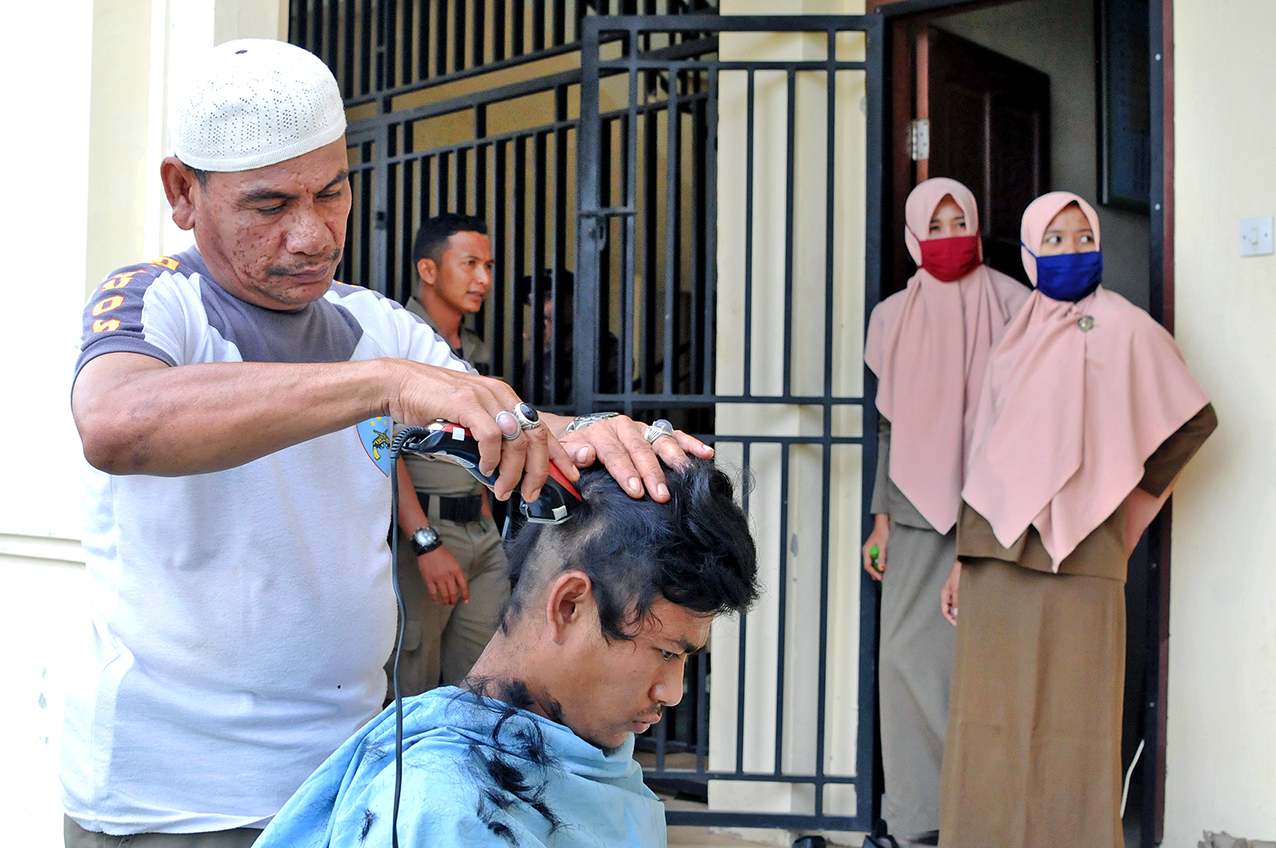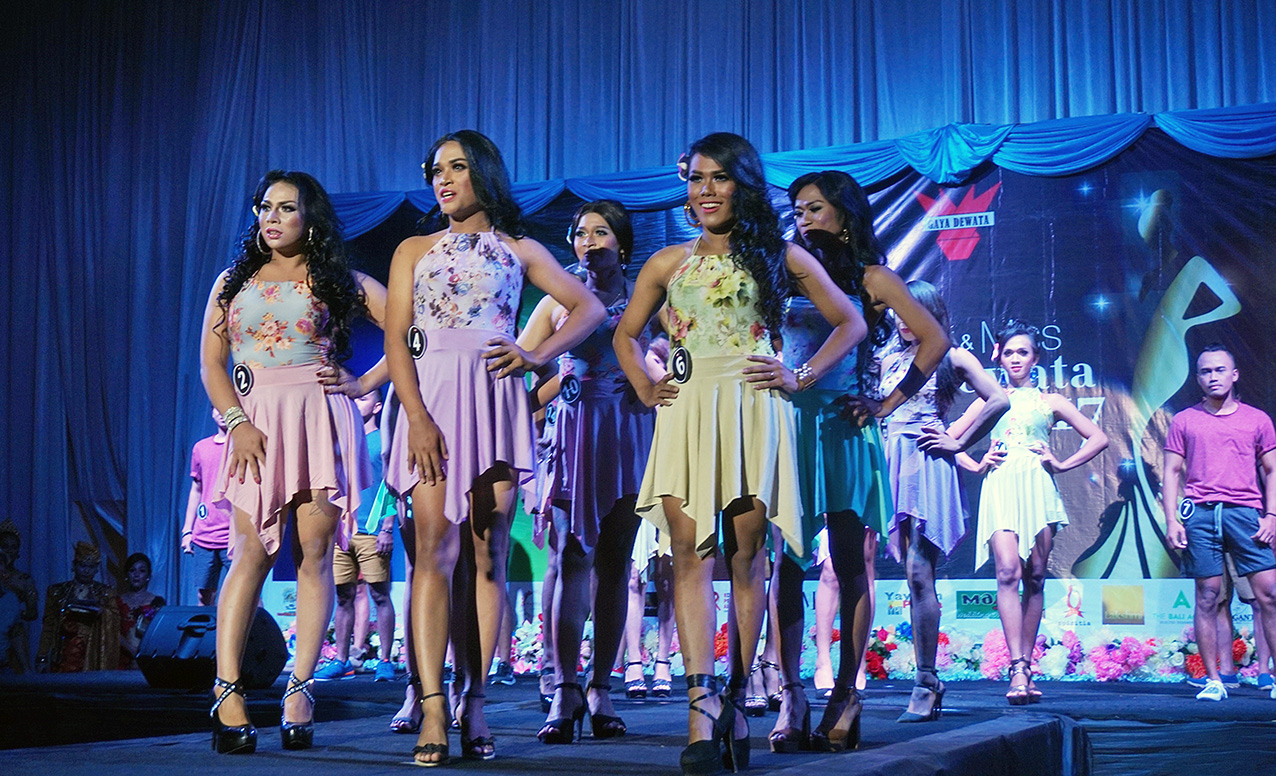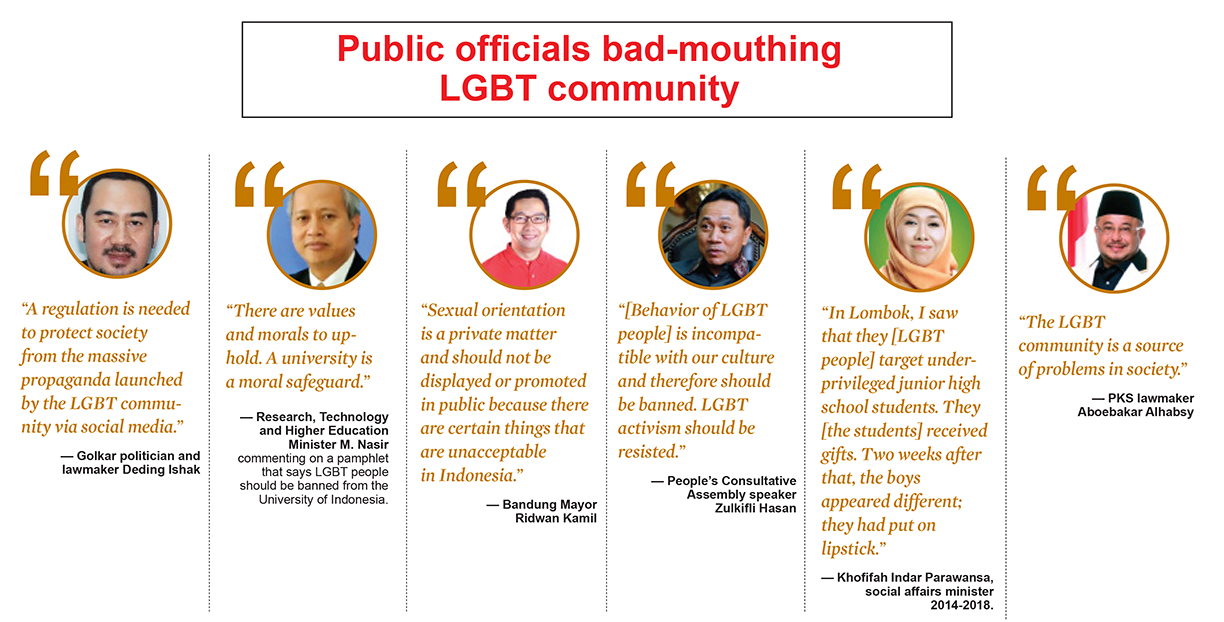Indonesia’s lesbian, gay, bisexual and transgender (LGBT) community has been subjected to prejudice, hatred and physical attacks. Adding insult to injury, public officials and religious leaders have further exacerbated the situation with their politically charged anti-LGBT rhetoric. The latest challenge is the insistence by lawmakers on criminalizing same-sex relations. The Jakarta Post’s writer Safrin La Batu reports on how the marginalized group is putting up a fight for its rights.
Zulfikar Fahd has traveled the world before but he felt going through the immigration process was never as heart-racing as he did at Toronto’s Pearson International Airport in Canada in late January.
That day, the 30-year-old had journeyed to a foreign land about 12,900 kilometers away from home with the intention of claiming asylum and would probably spend the rest of his life there. The reason: Because he is a gay — a sexual orientation so loathed in his home country of Indonesia that otherwise he faces flagellation that could put his life in danger.
He remembered his voice trembling when he told the officer at the immigration counter: “I’m claiming asylum.”
Zulfikar, who is open about his being homosexual, grew up as a middle class person in Jakarta. He attended law school at a top-notch university in the same city and later landed a job in a public relations company. Amid the sweeping Islamic conservatism and politicization of religion, he found an increasingly hostile environment.
“My privacy as a consenting adult man wasn’t respected in Indonesia,” he told The Jakarta Post in an emailed interview from Canada. “I didn’t feel safe when having a relationship and dating a man, or simply when having someone over in my private space.”
Even in a big city like Jakarta, where people generally believe in individualism, he did not feel at home. Strangely, many people there perceive homosexuality as dangerous as drugs or radicalism. He remembers a banner put up near his house read: “Communism, drugs, gambling, alcohol, radicalism and LGBT are prohibited in this area.”
“That hurt me a lot every time I saw it,” he said.
Zulfikar is not alone.
Gay couple Badri and Lena (pseudonyms) decided to move to Canada in early 2016 when state officials and religious figures went all out for hate mongering and stigmatizing the LGBT community.
“The year 2016 was a turning point for myself and other LGBT communities in the country. Persecution was on the table with handouts explicitly mentioning gays should be hanged, burned, thrown off high places or stoned to death,” Badri said.
“We decided it was time to move out or die at the hands of a mob simply because we wanted to live free as human beings,” he added.
Ahmad (not his real name) had a similar story to tell. He moved to Canada and was granted asylum in 2012 after he could no longer stand persecution and discrimination against gays.
“In Bandung [in West Java, where he was a student], I saw a transgender woman being forced off a bus because the driver did not want her near him,” Ahmad recalled. “I also witnessed how a transgender [woman] was pelted with stones by children in a housing complex.”
Unlike Zulfikar, Ahmad was not open about his being gay. His devout Muslim family and friends regard homosexuality as a sin and this forced him to lead a false life. He said he would be in trouble if his family found out about his sexual orientation.
“My friends even threatened to kill me if I was gay,” he said.
People like Zulfikar, Badri, Lena and Ahmad, left Indonesia not only for freedom but also on a mission. They want to tell the world about what is happening back home in Indonesia and bring about change for the better.
They retain the support of human rights groups like the Indonesian Federation of LGBT Communities (Arus Pelangi).
“The most important thing is how we can help each other, no matter if you are at home or abroad,” Arus Pelangi chair Yuli Rustinawati said.
LGBT communities’ fear of worsening persecution, criminalization and stigmatization is increasing as the House of Representatives revises the Criminal Code (KUHP), a legacy of Dutch colonial rule. A majority of the political factions at the House have agreed to criminalize consensual same-sex relations and premarital sex despite criticism from human rights activists who see the provisions as an intrusion on citizens’ privacy.
Critics say lawmakers and executive bureaucrats are pushing for the provisions to win popular votes in the 2018 regional and 2019 general elections. The LGBT community, too, shares this perception. Politicians hope to exploit the sensitive issue to win the support of Muslims, who constitute a majority of voters.
Amid the raging controversy, Zulkifli Hasan, chairman of the National Mandate Party (PAN) and People’s Consultative Assembly (MPR) speaker, recently angered rights activists and his rival politicians when he announced that five nationalist factions of the 10 political factions in the House had conspired to legalize same-sex relations.
After the political parties to which he apparently referred denied his insinuations and the dust of controversy settled down, it became obvious that Zulkifli had raised a false alarm, presumably to discredit his political rivals and raise his party’s anti-LGBT stature.
“It is only political hot air,” said Muhammad Isnur, an activist with the Indonesian Legal Aid Foundation Institute (YLBHI).
Pangi Syarwi Chaniago, the executive director of the Jakarta-based Voxpol Research Center and Consulting said: “Political parties should always be seen in this light. They offer populist platforms to get votes, which is something normal.”
Arus Pelangi and other human rights organizations have formed an alliance to amplify their opposition the planned revision of the KUHP’s LGBT provisions. They have taken to the street and promised more rallies unless the lawmakers drop their plans.
As lawmakers show no sign of backing down, human rights groups plan to try new legal avenues, including filing a judicial review with the Constitutional Court.
“The fight must go on,” Yuli declared.
But in fact, the LGBT issue was already burning even before the State Secretariat submitted the bill to the House for deliberation in 2012. Members of the LGBT community have been accused of spreading HIV/AIDS. Conservative Muslim preachers and academics have waged anti-LGBT campaigns, calling homosexuality a “mental disease” that needs curing.
Some government officials have publicly fueled anti-LGBT sentiment. In 2016, Defense Minister Ryamizard Ryacudu likened the LGBT movement to a proxy war that was more dangerous than the threat of nuclear warfare. The Council of Indonesian Ulema (MUI) issued a fatwa condemning homosexuality as a crime, while the Indonesian Broadcasting Commission urged TV stations to refrain from featuring effeminate men.
Not just stigmatized, members of the LGBT also face prosecution. Several members-only gay clubs in Jakarta have been raided by the police, normally as a result of tipoffs by conservative Muslim groups.
Last October, Police raided a gay spa in Central Jakarta and rounded up 51 men, charging them under the Pornography Law for allegedly displaying sexuality in public, although the spa was on restricted premises.
In January, Police in Aceh — the only province which adopts sharia — arrested 12 transgender women in six beauty salons in the towns of Lhoksukon and Pantonlabu. The officers shaved the women’s heads and forced them to wear men’s clothing to look like “real men”.
Condemnation from local and international human rights organizations prompted National Police chief Gen. Tito Karnavian to order an investigation. North Aceh Police chief Sr. Adj. Comr. Untung Sangaji was among those quizzed by the National Police’s internal affairs division.
“The recent raids on beauty salons are just the latest example of the authorities arbitrarily targeting transgender people simply for who they are,” Amnesty International Indonesia director Usman Hamid said in a statement.
Constitutionally, Indonesia does not prohibit consensual same-sex relationships. The existing KUHP only outlaws pedophilia and non-consensual sex. In the case of homosexuality, police usually pander to conservative Muslim groups on the pretext that the authorities’ priority is to maintain public order.
The Pornography Law, which has been rejected by some provinces such as predominantly Hindu Bali and Christian-majority Papua for its sharia leaning, have been the police’s most effective weapon.
The infamous Morality Law passed in 2008 defined homosexuality as “deviant” sexual behavior.
“The revision of Indonesia’s Criminal Code [prohibiting gay relations] definitely means taking the country back to the Dark Ages,” Badri said.
Well organized advocacy groups take on politicians
In Indonesia, the issue of lesbian, gay, bisexual and transgender (LGBT) rights started to become a major national issue that grabbed world attention only a few years ago when conservative religious leaders and public officials began to exploit the issue for their own political ends.
Since then the LGBT community has been scapegoated for various ills besetting Indonesia, such as the spread of HIV, moral decadence and prostitution. Today, the issue is a hot political “commodity” that no political actors want to miss out on.
Until the early 1990s, LGBT people used to enjoy relative peace free from fear of persecution. In cities, they formed social organizations to facilitate communications and the fight for common causes. When anti-LGBT sentiments grew, advocacy groups sprang up.
Dede Oetomo, a Felipa de Souza Award-winning gay activist and founder of the Surabaya-based LGBT organization GAYa Nusantara, recalls that when gay activists founded the Jakarta Transgender Association (Hiwad) in 1969, it was no big deal.
As the first well-documented transgender organization in the country, Hiwad secured the support of the then Jakarta governor, the legendary Ali Sadikin. Back then, transgender people were regarded as “socially disabled” and entitled to support from the Social Affairs Ministry.
No objection was raised and no political fallout undermined him for the sympathy. On the contrary, Hiwad and Ali’s support even inspired transgender communities in other regions to form their own organizations.
“Transgender groups were welcomed at that time,” Dede told The Jakarta Post.
Another gay organization, Lambda Indonesia was established in 1982. Billed as the largest in Asia, it dissolved in 1986 as a result of mismanagement. But Lambda’s demise did not mean the end of the idea. Thanks to the friendly political climate, in 1987 Dede founded GAYa Nusantara, which still exists today.
Dede, 64, is also a sociologist and AIDS activist. In 2012, he was a candidate for the National Commission for Human Rights (Komnas HAM). His sexual orientation was supposedly his undoing.
Ironically, LGBT people enjoyed greater freedom during the authoritarian New Order than they do now in the supposedly democratic era of today. So in 1986, lesbians established the Indonesian Lesbian Network (Perlesin) but the organization was also short-lived, again as a result of mismanagement.
Relations with the government were so warm that gay groups were treated as “partners” in combating the spread of HIV/AIDS. Particularly GAYa Nusantara was often invited by the Health Ministry for joint projects.
But that was until 1993 when the groups began to lose the government’s favor. “We were no longer invited to their meetings and they no longer recognized us as partners,” Dede recalled.
Why the government had a change of heart remains a mystery. One could only guess that it may have been because some conservative Muslim leaders and national media began to make an issue of unorthodox relations.
In the wake of the 1998 political reform and the rising Islamic conservatism, advocacy groups appeared to defend the marginalized LGBT people. Because the conservative Muslim groups were better organized, the battle became more open and less one-sided.
Among the support groups, the Indonesian Federation of LGBT Community (Arus Pelangi) is probably the best known today. Established in 2006, it focuses on campaigns to raise public awareness about sexuality and different sexual orientations and expressions.
Now while lawmakers are working to make same-sex relations a crime, Arus Pelangi has joined forces with rights organizations like the Indonesian Legal Aid Foundation Institute (YLBHI) the Jakarta Legal Aid Institute (LBH Jakarta) and the Indonesian Criminal Justice Reform (ICJR) to block the controversial draft law.
In the course of time, Arus Pelangi has also expanded its agenda to cover all issues related to democracy and human rights. Recently, together with like-minded groups, it has actively lobbied lawmakers to drop controversial articles in the Criminal Code bill, such as the criminalization of some same-sex relations and the extension of the adultery definition to include consensual premarital sex.
“These [controversial] articles are dangerous not just for the LGBT community but for the whole of civil society, including journalists,” Arus Pelangi chairperson Yuli Rustinawati said as she took part in a street protest against the bill.
Politicians insisted on including the criminalization of homosexuality and casual sex after the Constitutional Court rejected a petition on the subject by a group of Muslim academics affiliated with an Islamic group, the Family Love Alliance (AILA).
The Constitutional Court rejected the petition on the grounds that drafting new provisions was the remit of lawmakers.
Even though more LGBT organizations have emerged, one problem remains: Many LGBT people are too afraid to come into the open for fear of pressure, including from families and peers alike.
As Yuli says, it is not always easy to be open about one’s sexual orientation in the country.
 Keep it short: In Aceh, the only province that formally adopts Islamic law, sharia enforcement officers target not only LGBT people but also men who sport hairstyles that are not deemed Islamic.(Antara/Ampelsa)
Keep it short: In Aceh, the only province that formally adopts Islamic law, sharia enforcement officers target not only LGBT people but also men who sport hairstyles that are not deemed Islamic.(Antara/Ampelsa)
| Reporter | : | Safrin La Batu |
| Managing Editors | : | Primastuti Handayani |
| Desk Editors | : | Pandaya, Imanuddin Razak |
| Art & Graphic Design Head | : | Budhi Button |
| Graphic Design Head | : | Hengky Widjaya |
| Photographers | : | JP/Luh De Suriyani, Antara/Ampelsa |
| Technology | : | Muhamad Zarkasih, Mustopa, Sandy Riady Hasan |
| Multimedia | : | Bayu Widhiatmoko |



